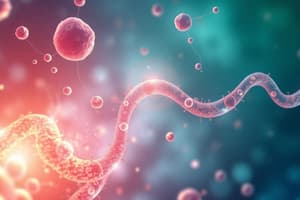Podcast
Questions and Answers
What is the primary organ involved in the metabolism of drugs?
What is the primary organ involved in the metabolism of drugs?
- Liver (correct)
- Lung
- Kidney
- Intestinal mucosa
First-pass metabolism refers to the initial metabolism of drugs in the liver before reaching the general circulation.
First-pass metabolism refers to the initial metabolism of drugs in the liver before reaching the general circulation.
False (B)
What is the main consequence of drug metabolism?
What is the main consequence of drug metabolism?
Termination of drug action
Drugs are converted from lipophilic compounds to _______ products for easier excretion.
Drugs are converted from lipophilic compounds to _______ products for easier excretion.
Match the following terms with their descriptions:
Match the following terms with their descriptions:
Which of the following may influence drug metabolism?
Which of the following may influence drug metabolism?
Metabolism of one drug does not affect the metabolism of another drug.
Metabolism of one drug does not affect the metabolism of another drug.
Name one site where first-pass metabolism can occur.
Name one site where first-pass metabolism can occur.
Which phase of drug metabolism involves functionalization reactions?
Which phase of drug metabolism involves functionalization reactions?
Drug metabolism is always considered detoxification.
Drug metabolism is always considered detoxification.
What is a prodrug?
What is a prodrug?
The process of linking an endogenous moiety to a drug or metabolite in drug metabolism is called __________.
The process of linking an endogenous moiety to a drug or metabolite in drug metabolism is called __________.
Which of the following compounds are least subject to metabolic transformations?
Which of the following compounds are least subject to metabolic transformations?
What is lethal synthesis?
What is lethal synthesis?
The liver is the organ with the highest levels of drug metabolizing enzymes.
The liver is the organ with the highest levels of drug metabolizing enzymes.
Flashcards
Drug Metabolism
Drug Metabolism
The process where the body breaks down drugs and other foreign compounds (xenobiotics) into simpler substances.
Liver
Liver
The primary organ responsible for drug metabolism, containing a plethora of enzymes specialized in breaking down drugs.
Drug Metabolism: Lipophilic to Hydrophilic
Drug Metabolism: Lipophilic to Hydrophilic
The conversion of lipophilic (fat-soluble) drugs into hydrophilic (water-soluble) metabolites, making them easier to excrete through urine or bile.
First-Pass Metabolism
First-Pass Metabolism
Signup and view all the flashcards
Drug Metabolites
Drug Metabolites
Signup and view all the flashcards
Pharmacokinetics
Pharmacokinetics
Signup and view all the flashcards
Pharmacodynamics
Pharmacodynamics
Signup and view all the flashcards
Individual Variation in Drug Metabolism
Individual Variation in Drug Metabolism
Signup and view all the flashcards
Prodrug Activation
Prodrug Activation
Signup and view all the flashcards
Phase I Metabolism
Phase I Metabolism
Signup and view all the flashcards
Phase II Metabolism
Phase II Metabolism
Signup and view all the flashcards
Bioactivation and Toxication
Bioactivation and Toxication
Signup and view all the flashcards
Carcinogenesis
Carcinogenesis
Signup and view all the flashcards
Drug Metabolism Doesn't Always Mean Deactivation
Drug Metabolism Doesn't Always Mean Deactivation
Signup and view all the flashcards
Study Notes
Drug Metabolism I - Lecture Topics
- Phase 1: Basic Principles of Drug Metabolism (DM)
- MOOC (Massive Open Online Course)
Course Objectives
- Comprehend, apply, and evaluate the key concepts and principles of drug metabolism.
- Identify and characterize major metabolites of a given drug and the specific enzymes involved in its metabolism.
The Fate of a Drug
- Drugs begin with a dose.
- Absorption to the body occurs.
- Distribution is to most tissues and then to plasma where some is protein-bound and some is free.
- Metabolism occurs, and the drug is eliminated through renal excretion.
- Distribution also occurs to the biophase where receptor binding results in an effect.
- These processes are grouped in Pharmacokinetics and Pharmacodynamics.
Stages of Drug Metabolism
- Absorption: Drug travels to the site of administration, moves into the bloodstream.
- Distribution: Drug moves throughout the body. The drug/metabolites move into the tissues.
- Metabolism: Drug/metabolites change in tissues.
- Elimination: Drug/metabolites are removed from the body in urine, feces, or bile.
Drug Metabolism
- Metabolic breakdown of drugs by living organisms (xenobiotics), mostly in the liver.
- Converts lipophilic compounds to hydrophilic compounds for easier excretion.
- Can turn procarcinogens into toxic mutagens.
- Individual variations in factors (genetics, physiology) significantly impact metabolic rates, and the metabolism of one xenobiotic may influence the metabolism of others.
Metabolism in Non-Hepatic Tissues
- Intestinal mucosa (GI tract)
- Kidney
- Lung
- Bacteria in the GI tract are involved in drug metabolism.
First-Pass Metabolism
- A major process of metabolism that happens in the liver and intestinal tract before reaching the general circulation.
- Metabolism happens in the gut which results in inactive metabolites.
Drug Metabolism Pathways
-
Phase 1: Introduces or uncovers polar groups (such as CO₂, OH, or NH₂) via oxidation, reduction, or hydrolysis.
-
Phase 2: Links an endogenous moiety (like GSH, sulfate, glycine, glucuronic acid) to the original drug or phase 1 metabolite. This creates polar metabolites which cannot cross membranes and are excreted.
-
Phase 3: Conjugated xenobiotics are processed further, recognized by efflux transporters, and removed from the cells.
Drug Metabolism Example-Morphine
- A hydrophobic drug that is metabolized via Phase 1 (demethylation) & Phase 2 (glucuronidation) to become more hydrophilic and excreted.
Implications of Drug Metabolism
- Termination of drug action
- Activation of prodrugs
- Bioactivation and toxification
- Carcinogenesis
Two Xenobiotic Categories
-
Hydrophilic compounds (like saccharin, strong acids, or bases) are largely unaffected by metabolic transformations.
-
Highly lipophilic compounds (like DDT): Many metabolic reactions often do not lead to inactivation or detoxification, instead, some metabolites can be as potent as the original, bind covalently to proteins, DNA, and cause mutagenesis/carcinogenesis.
Lethal Synthesis
- The metabolic conversion of non-toxic Parathion to paraoxon, a potent acetylcholinesterase inhibitor.
Major Sites of Metabolism
-
Drug metabolism occurs in various tissues, but the liver is the primary organ for metabolism, followed by the lungs, kidneys, and intestine, respectively. The CNS has very low metabolic activity.
-
The liver, due to high blood flow and numerous metabolic enzymes, is the primary site of drug clearance:
- High: liver - Medium: lungs, kidneys, intestine - Low: skin, testes, placenta, adrenals - Very low: CNS -
Extrahepatic microsomal enzymes and non-microsomal enzymes (like hepatic enzymes) also contribute to the metabolism.
Studying That Suits You
Use AI to generate personalized quizzes and flashcards to suit your learning preferences.




